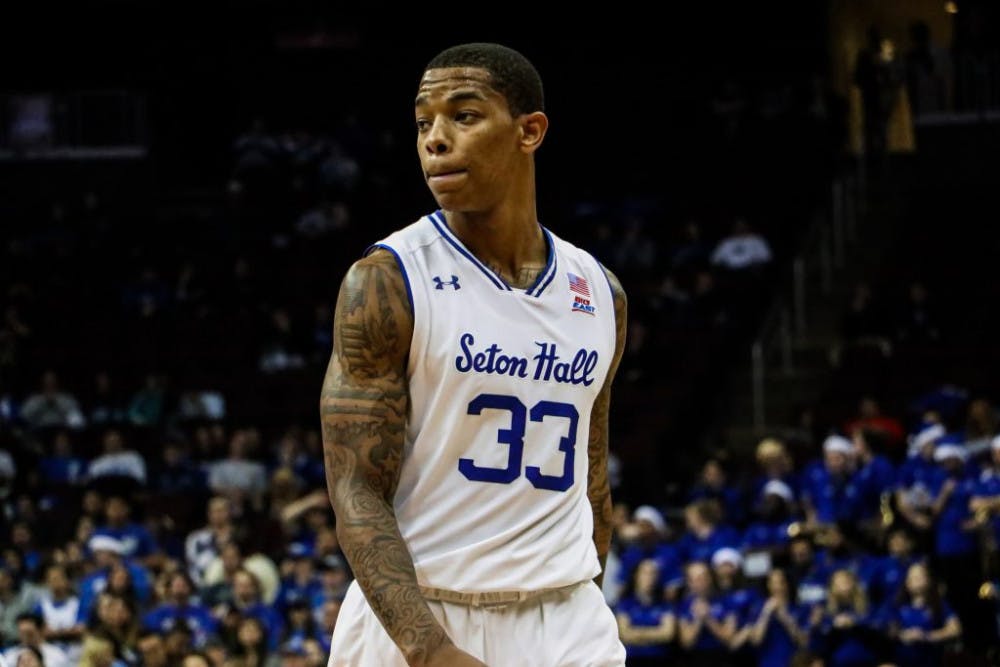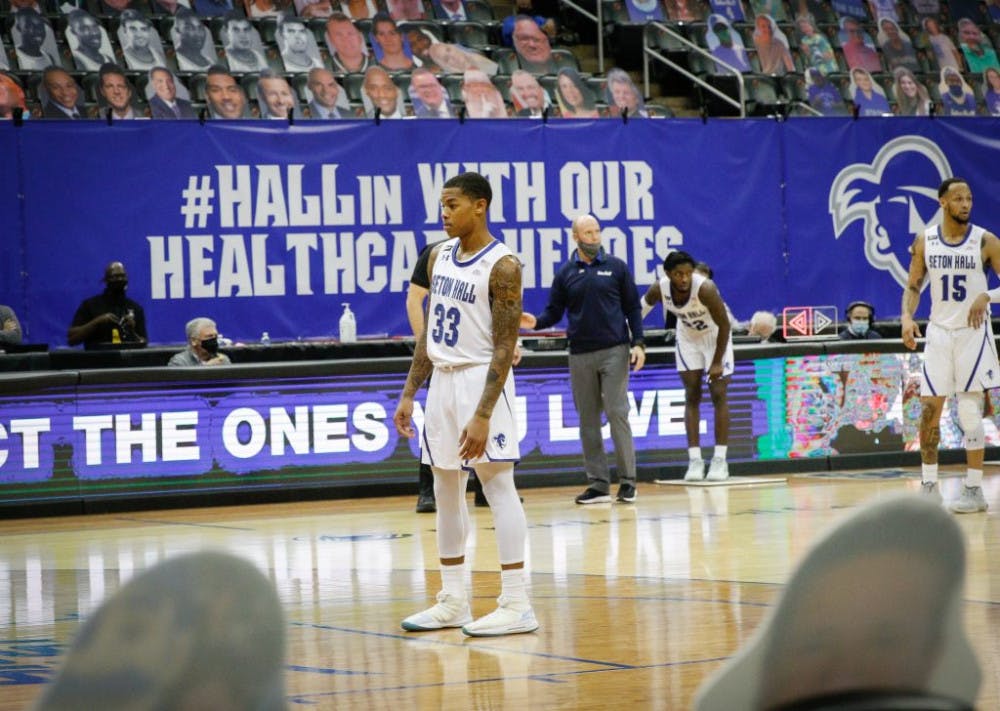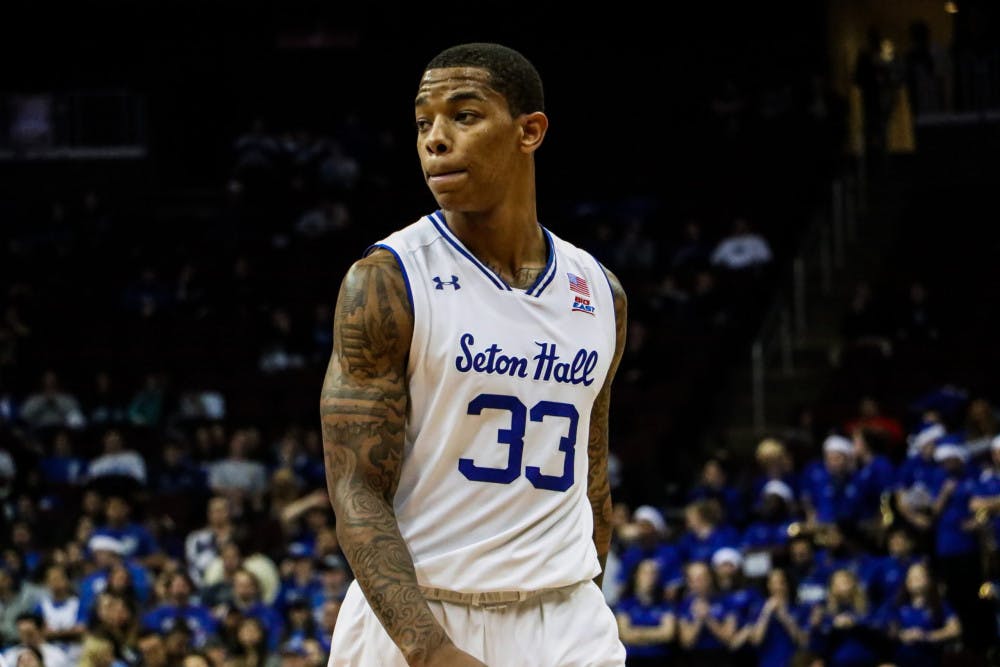Shavar Reynolds Jr. has been a four-year guard on the Seton Hall men’s basketball team since he earned a spot on the roster as a walk-on his freshman year. He then earned a scholarship before his sophomore year for the 2018-19 season.
The formative years of his college basketball career were spent playing in a reserve role off the bench for the Pirates. He built a reputation for himself as a hard-working, relentless defensive presence in the backcourt and a player capable of providing the team with a last-second, game-winning basket if needed. As a junior, Reynolds continued to serve as the team’s sixth man and defensive stopper and averaged 4.2 points, 1.8 rebounds and 1.0 assists in 30 games.

Reynolds became the starting point guard for Seton Hall in his senior year, starting all 27 games during the 2020-21 season for the Pirates. He hit career highs in points and assists against Oregon, scoring 17 points and dishing out eight assists. Reynolds also shouldered the responsibility of more minutes without a clear-cut back-up and the responsibility of mentoring freshman Jahari Long throughout the year. Next season, Reynolds will begin the next chapter of his college basketball career as a graduate transfer at Monmouth University.
Before Seton Hall, Reynolds was a three-year captain at Manchester Township High School where he also became a 1,000-point scorer. He is Manchester’s all-time leader in single-game, single-season and career assists as well as a three-time All-Conference selection.
In this piece, Reynolds shares his ambition of inspiring and motivating others with his journey as a four-year college basketball player through a first-person point of view. While many have come to know his story as a walk-on at Seton Hall, this is the extended version of how that chapter of his life made him a role model.
By Shavar Reynolds Jr. as told to Justin Sousa
You don’t ever remember the moment you become a role model—it’s just something that happens.
When I was younger, I didn’t really get it. I was going through the motions of things; I was experiencing things for the first time and wasn’t really observing people around me. You just live your life, and you don’t really think much about it. It’s all just actions.
I would say it wasn’t until high school that I started understanding how things work, how society works and the natural tendencies that we all have as people. I was obviously still trying to figure myself out and figure out my own path, but these subtle realizations started happening.
One of those realizations was how many people doubted me. I had people telling me I couldn’t do things when I was still just playing high school basketball. I had a few supporters too, but there were people that early in my life doubting my capabilities. It wasn’t just something that happened to me when I joined the Seton Hall men’s basketball team, it was something I had to persevere through to even get to that point.

But I liked that. I took pride in traveling the hard path to get to where I am because it made me who I am today. When people ask me about my story, I tell them I’m glad I went this route. I’ve seen everything for what it is. In the moment, I always used to ask myself why I had to work harder than everyone else and why I had to give more to people who didn’t deserve that from me. Through all the failures, though, I learned so much in the process.
The people I look up to showed that same level of perseverance and work ethic during the early years of their careers. President Barack Obama, Will Smith and the late Kobe Bryant all inspired me growing up and continue to inspire me. They never let people deter them from reaching their goals and ambitions. What’s even more admirable about them is that they all translated that work ethic from their work persona to their personal lives. They built successful lives and careers for themselves on a foundation of hard work and self-belief.
Kevin Hart—as odd as that sounds—is another person who I’ve come to view as a role model. Now, I know most people know him as a stand-up comedian, but what I admire most about him as a person is his ability to always put life into perspective through his craft.
He’s been on both sides of the spectrum. He’s been poor and lived in poverty, and then he skyrocketed to the top. It took him years in between but, in his story, you can see that he was a normal person who became famous through a relentless effort to achieve his goals.
We also share a similar way of thinking. I watched a recent interview of Hart’s that was about the first time he met Jeff Bezos and other people in that upper echelon of fame and fortune. He was talking to them to acquire knowledge and information from them about how they got to where they are in life. A lot of people go away from that, but he wanted to ask them how they did it.
When I was a walk-on, I’d do the same thing with Angel Delgado and Khadeen Carrington. I’d ask them how they got to be as good as they were and what they did to maintain that level because you can’t be successful if you don’t ask.

And like I said before, his journey of starting from nothing and turning it into something is what I want to emulate in my life. Even when he reaches one goal, he doesn’t just settle or become complacent with it. He looks at how he can improve upon that and continues to grow. Like, he’s a comedian with a sneaker deal—that’s crazy to me. He even has his own network because he just doesn’t stop working.
That’s the biggest thing for me. I don’t want to settle; I want to strive for more. I don’t want to sit and just be content with what I have, I’ll do that when I’m done and have fully accomplished what I had set out to do. That’s in basketball, that’s in the social work that I continue to do, that’s in my work in the Black Lives Matter movement and that’s in my business work as well.
There’s a quote by Socrates that really captures that mindset, and it goes, “I am the wisest man alive, for I know one thing, and that is that I know nothing.”
I want to get my hands in everything and acquire as much knowledge as possible. At the end of the day, I know I love basketball, but I also love to inspire and motivate people through work I do off the basketball court. And nowadays, there’s more that you can do as an athlete to help inspire and motivate people while also honing your craft. That’s why I’m so invested in the idea of being a role model.
As I got older, I started to understand my purpose. My purpose to live is to inspire and motivate people to be the best versions of themselves. That’s what this is about. It’s about building people up to be the best versions of themselves. Though we may not know how to get there, nor do we know the path, that’s the essential goal.
I think God gave us the blueprint to life. You live for others and you are the best version of yourself that you can. I thrive on treating people how I want to be treated. From being a walk-on to even now, I will never change my approach to treating people how I want to be treated.
Justin Sousa can be reached at justin.sousa@student.shu.edu. Follow him on Twitter @JustinSousa99.





